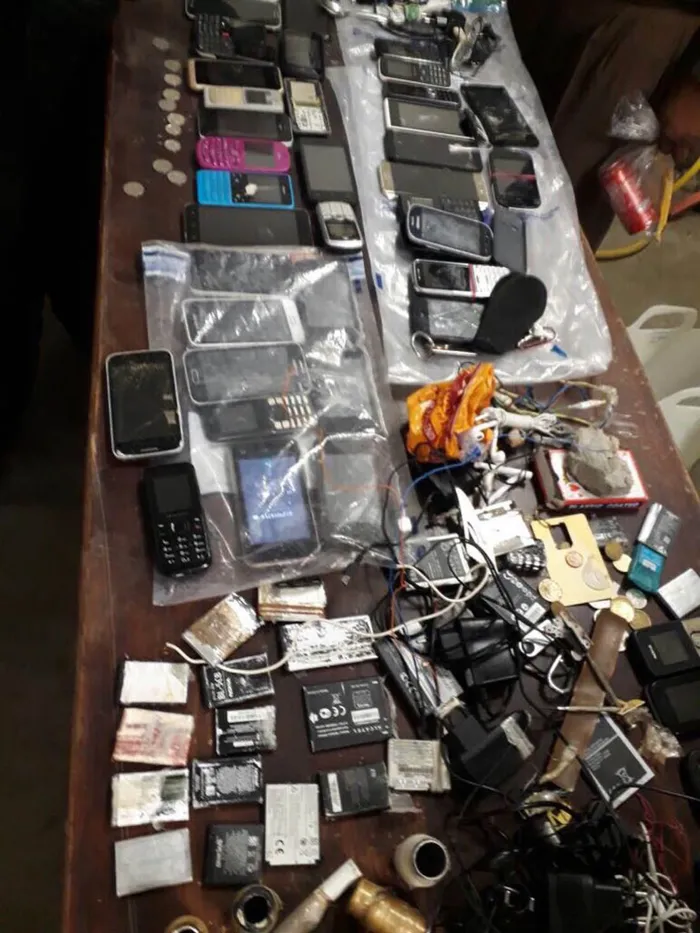Pollsmoor Prison to trial advanced jamming technology amid crime concerns

Cellphones and other items found after a raid inside Pollsmoor Prison
Image: Supplied
After Cape Town Mayor Geordin Hill-Lewis’ call to jam cellphone signals at Pollsmoor Maximum Security Prison, the Department of Correctional Services said the prison is among five prisons identified for a pilot project using advanced jamming technology.
Hill-Lewis said the measure is necessary because criminal networks continue to operate from behind bars.
“The City has received various reports that crime and extortion activity is being coordinated by phone from within Pollsmoor. On a recent roads project inspection in Bishop Lavis, I was informed that the contractor had left the site due to extortion threats made by phone call from an underworld figure inside Pollsmoor.
“This shows we must do more than just jail criminals, we have to prevent their ability to coordinate crime from within prisons,” he said.
But criminal lawyer Bruce Hendricks cautioned that cellphone jamming is a legally fraught move.“The jamming of cellphones is regulated by the Electronic and Communications Transactions Act. Under normal circumstances, jamming of devices will be illegal as it poses a risk to public safety and emergency calls,” he said, adding that residents living around Pollsmoor could be affected if the signal spill-over blocks their phones.
Hendricks further warned that prison staff themselves would suffer.
“The jamming will also affect emergency calls like 10111, and wardens won’t be able to receive calls from schools or family members in case of an emergency. It will also complicate prisoner visits, as families rely on communication for bookings,” he explained.
Instead, Hendricks argued that corruption and lax searches are the real culprits.“The approach in my view is wrong. The use of cellphones should be restricted in certain areas of the prison and not allowed to enter there. The issue of prisoners with cellphones can be eradicated if officials seize all corrupt activities and regular sweeping and searching takes place,” he said.
He added that detainees should also be properly searched when returning from court orbeing loaded onto prison transport.
Looking abroad, Hendricks noted that jamming technology does exist in maximum-securityprisons in Brazil and Colombia, but the circumstances differ.
“In those countries, maximum prisons are very far away from normal residential areas. They also improvise and make arrangements to mitigate the risks. That’s not the case at Pollsmoor, which is located in a dense residential community,” he said.
The Department of Correctional Services (DCS) has acknowledged the depth of the crisis. Between January 2024 and January 2025, 41 853 cellphones were confiscated nationwide, a figure the department said underscores the scale of smuggling. A total of 64 officials were implicated, with 16 dismissed, 37 still under investigation, and 11 criminally charged.
Eunè Oelofsen, spokesperson for Minister of Correctional Services Pieter Groenewald, confirmed that Pollsmoor and St Albans prisons are among five prisons identified for a pilot project using advanced jamming technology.
“Staff communication and security is duly considered before implementation. The aim of the project is to enhance security without hindering day-to-day operations,” Oelofsen said.
She identified three main smuggling routes: offenders returning from court or hospital visits,corrupt officials, and unscrupulous contractors who exploit their legitimate access to prisons.
“The department continues to strengthen vetting, monitoring, and search procedures for all three categories to reduce the risk of contraband entering correctional centres,” she said.
Related Topics: